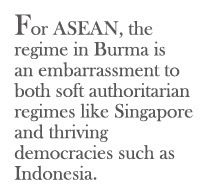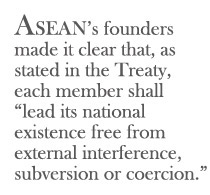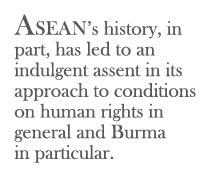Southeast Asian Nations Risk Dissension by Ignoring Human Rights
Southeast Asian Nations Risk Dissension by Ignoring Human Rights

JAKARTA: Twelve years ago, the late Indonesian Foreign Minister Ali Alatas defended opening the door of ASEAN to authoritarian countries such as Burma, Cambodia and Laos by saying “No international organization places human rights as a conditionality of membership, not even the United Nations”. With democracy on the march in Indonesia, the largest country of the group, and unremitting political and civil rights violations in others – especially Burma – that precedence of process over substance has become a haunting liability for ASEAN. For ASEAN, the ruling regime in Burma is an insufferable embarrassment to both soft authoritarian regimes like Singapore and thriving democracies such as Indonesia. The embarrassment was highlighted during the recent annual summit of the group at which the US Secretary of State Hillary Clinton lambasted Burma for its terrible human rights record before an uncomfortable group of senior officials.
The so-called ‘ASEAN Way’ – a preference for decorum based on non-interference and adherence to a consensus decision making process irrespective of the consequent iniquities – has so far guided the organization. The ASEAN ‘union’ was in itself a remarkable achievement for a region which has no history of regional cooperation, and months before the founding still embroiled in low intensity conflicts. The way that came to guide the group evolved out the vested interests of its five founding members – Indonesia, Malaysia, the Philippines, Singapore and Thailand – to create a passive regional environment which allowed them to focus individually on economic development thereby justifying their respective autocracies.

Beyond the fundamental issues of state sovereignty, ASEAN’s founders made it clear that, as stipulated in the defining Treaty of Amity and Cooperation (TAC), each member shall “lead its national existence free from external interference, subversion or coercion,” an arrangement of non-interference in the internal affairs of one another.
All 10 current ASEAN members had their roots in some form of autocracy. A few have emerged, most remain, while another reverted to non-constitutional means to overthrow government.
When ASEAN leaders gathered in Cebu, the Philippines, four months after the Sept. 19, 2006, military coup in Thailand, not a single member publicly rebuked or questioned the validity of the Thai representatives sent by the new military administration to the summit.
This history, in part, has perhaps led to an indulgent assent in ASEAN’s approach to conditions on human rights in general and Burma in particular.
Philippine President Gloria Macapagal Arroyo in 2007 threatened to stall the ASEAN Charter if Burma did not release Aung San Suu Kyi. But the move was more grandstanding than actually making a stand. Everyone knew that failure to ratify the Charter would hurt Manila more, not the regime in the jungle fastness of Naypyidaw.

Situations where ASEAN has spoken up usually involves egregious violence, such as the case when in August 2007demonstrations in Burma were violently put down. But even then ASEAN deferred action to the United Nations where ultimately Burma could usually rely on its most powerful ally, China, to cushion any rebuke from the UN Security Council.
Alienating Burma does nothing for ASEAN and only pushes the country further into China’s sphere of influence. The last thing it wants is to hasten Burma’s descent as Beijing’s client state, the next North Korea, as it becomes China’s backdoor to the Indian Ocean. An outcome that is not only upsetting to ASEAN, but a detriment to the emerging balance of power in the region.
Burma could fast become the frontline of regional power rivalry between China and India, with the latter anxious at having its North-Eastern defenses outflanked and its dominance in the Bay of Bengal challenged.
In the absence of a truly effective regional security framework, the keyword is stability. The human rights agenda, with its call for civil society, may ultimately lead to regime change. But the prospect of instability is a scenario unacceptable to all. ASEAN is always wary of unstructured change. China would have to deal with the widening spill-over of Burmese drug related issues affecting Yunnan province. Even India would have to resolve an escalating Naga insurgency along its border with Burma.
The US administration under President Barack Obama has unsurprisingly continued the tough rhetoric of its predecessor. That in itself will not prod ASEAN to make headway on human rights issues or change their overall tone towards Burma.
Nevertheless there are two interesting angles emerging not present during the past decade which may encourage ASEAN to do something more than the usual.
The first is the charm offensive of the State Department towards recommitting itself in the region, attending regional security meetings and the symbolic gesture of signing TAC. These gestures have won America untold ‘brownie points’ among officials in the region. With the US proclaiming to be ‘back’ in the region, ASEAN may have a stronger spine dealing with China.

The second was the happy coincidence of the appearance in the news of suspected links between Burma and North Korea in the nuclear field. While there was no confirmation about the suspected nuclear development or nuclear cooperation with Pyongyang, the mere speculation about it will reshape regional security thinking. There is no way Southeast Asia would want or need a ‘North Korea’ on its porch.
Other than overriding security dilemmas, there is no reason to think that ASEAN will change its dawdling approach to human rights in the region.
Nevertheless, the divergence of political values is increasingly creating a strain within ASEAN. A fact more evident in the last two years than ever before. As the primus inter pares, Indonesia is seeing its civil society begin openly to debate the relevance of ASEAN, which for four decades has been enshrined as the cornerstone of its foreign policy. The rethink has emerged from a frustration at the lethargy and cosmetic changes ASEAN has endorsed on issues related to civil and political rights. Exasperation that despite recognizing itself as one of the most successful regional groupings over the last half century, it is eons behind its counterparts in Europe, perhaps even Africa and South America in setting mechanisms for the protection of human rights.
Moreover, there is dissatisfaction that key documents, the ASEAN Charter last year and the terms of reference for the ASEAN Human Rights Body, have been so watered down from their original intent that they become an aesthetic fig leaf to cover inaction.

Perhaps there is also the gradual realization among the civil society in many other fellow members that eventually nothing can change ASEAN in its human rights outlook if the association does not reinvent itself. After all, how much can one expect from an organization that was constructed to serve the convenience of its leaders and not the values of its citizens?
As long as it is profitable as an economic entity, ASEAN will remain intact with its members renewing their commitment. However, its members, driven by the diverse political interests of their citizens, are likely to begin looking at alternatives more suitable to their various political values. Until then, as the handwringing over human rights shows, it will remain a region economically united, but ideologically divided.
Meidyatama Suryodiningrat is the deputy chief editor of The Jakarta Post daily newspaper.